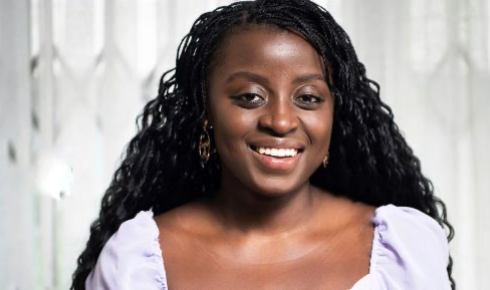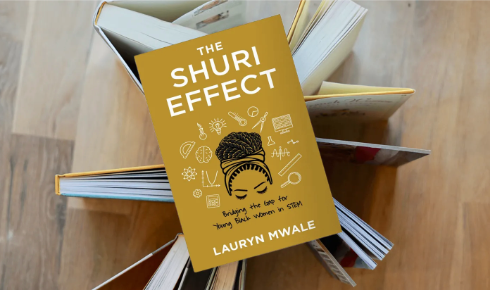“I thought I’d just be surrounded by chess geniuses for my whole degree”

As part of Black History Month 2025, the RSB’s Jade Hall spoke to author of The Shuri Effect, Lauryn Mwale, about how her experiences studying mathematics as an undergraduate led her to write the book, and the inspiring Black role models she found during her research.
One of the core elements of the book is about how Black women, as a demographic of interest, are under researched. Is that what inspired you to start writing this book?
Yes! When I got to the University of Edinburgh, I attended the welcome lecture for all of the undergrads at the School of Maths. This Black girl walked up to me, and she was so lovely – and we ended up spending lots of time together. But it was just her and me. Nobody else looked like us.
Because I was born and raised in a majority black country, I hadn't had to worry about representation in that way. But that moment made it really clear and obvious to me what the next four years were going to look like.
That night, I went home and tried to Google some stats. Firstly, a lot of the statistics were American, and those I could find were really dire. According to the National Centre for Education Statistics in the US just 2.9% of Black women get STEM degrees. It was so, so hard to find information about Black women in the context I was exploring.
Once I looked into the data, and interviewed the wonderful women whose quotes are documented all across the book, you see there can often be a fixation on better understood occupations, like law, engineering and medicine, which might provide financial security, rather than parents advocating for a love of learning and exploration. STEM is one avenue for that.
 Lauren Mwale is the author of a book that looks at the complex reasons why there are so few Black women in STEM
Lauren Mwale is the author of a book that looks at the complex reasons why there are so few Black women in STEM
You've just touched on the fantastic interviews throughout your book. You refer to them as "powerhouse role models", so how did you find them?
I sat down and looked through loads of blogs and initiatives and organisations whose mission was getting more women in STEM, and searched for any representatives of the Black cohort of their inclusion projects. I found STEM inclusion initiatives specifically for Black women like Black women in Astro and interviewed its president Ashley Walker, who was so fun. It was so enjoyable to sit with someone who so enjoys their work.
I also tunnelled through LinkedIn; I looked at researchers quoted in news articles. There is a haematologist I interviewed who studies sickle cell anaemia, which my siblings had, and so my mom's always sharing links about that. So I was looking everywhere, for any opportunity.
The women I interviewed were lecturers, people in industry, other students; they were doctors who run initiatives to get other young doctors involved. And that excited me about what my STEM journey could be, and what anyone's STEM journey could be.
Not everyone needs to get a hard science degree. That is not the point of my book. My point is that more people should consider science at school, more parents should consider pure science subjects to be legitimate subjects. We need more supportive teachers, and the opportunity to see role models.
It’s about having the opportunity to gain that confidence and self-belief that doesn't lead to Black women ‘self-selecting’ out of STEM.
You write about ‘self-efficacy’, an individual's perception of their ability to succeed in specific situations. STEM is perceived as so hard by society and the public, so how do you think we can change perceptions to make sure it feels accessible to people?
I don’t think representation is the answer to everything, but it does help change mindsets and that moves the needle. I think about my flight to university, which was very dramatic: it only dawned on me then what I’d committed to – a degree in mathematics – and I just thought I was going to be surrounded by, like, chess geniuses. I began to think "this is a bad idea, this is not going to work." It was a 16-hour flight, and I couldn’t sleep.
Luckily, they had the film Hidden Figures on the plane. It was the first time I’d seen it, and it’s obviously set in a different time, with much higher stakes [the film follows three female African-American mathematicians, Katherine Goble Johnson, Dorothy Vaughan, and Mary Jackson, who worked at NASA during the Space Race.] But it gave me something to look at, those great women, whose identities are fun and vibrant and felt more akin to mine. It gave me something to go on, that this is not the land of the very quiet chess genius, this is the land of everyone.
I think self-efficacy is built up when you see someone who has a life, and a vibe, and an energy that feels akin to yours, or feels akin to what you're building towards. Then, you do your part. Once you have the seed of a dream, your job is to nurture it by following through on the required steps and promises you make to yourself. I find that the more I did what I said I would do, the more I believed in my abilities.
What I thought was really interesting in your book is that you highlight how the ‘leaky pipeline’ metaphor is a simplistic model when it comes to black women. Can you expand on that a little bit more?
The leaky pipeline, with kids leaving out of all these valves, is a powerful, visual metaphor. But when things are made really simple, and there’s no space for everything to be packed into the diagram, you lose important information. People leak out and back in; some people don’t start at the start; some people never have the support to go into the funnel.
Also, to call it ‘leaky’ is to imply that it’s an accident or people leaving is a feature. When in fact, people are being pushed out. There is real exclusion happening through culture and environment that feels hostile, regardless of someone's self-efficacy. For example, one could say that I was shoved out by Covid, when I decided I was simply not equipped to and had limited desire to continue in the half-baked hybrid model. As I heard in my interviews and the stories of many of my role models, it’s the micro-aggressions that kill you. It's death by a thousand cuts. And there are macro aggressions at play, too. Real cultures of hostility in faculties, in academic departments, in professional environments that shove Black women out. And so they didn't ‘leak’ out of the pipeline at all – they had every intention of making it to the end but circumstance forced pivots.
 According to the National Centre for Education Statistics in the US, just 2.9% of Black women get STEM degrees
According to the National Centre for Education Statistics in the US, just 2.9% of Black women get STEM degrees
Some of the most shocking bits in your book, I found, were the passages about race and gender issues in the wider STEM environment, not just in education. For example, medical students thinking Black patients had higher pain tolerance; pulse oximeters not working accurately on Black skin, and speech recognition systems misidentifying words from black users. Did this shock you too? How do we improve STEM innovation and decision-making so that it works for everyone?
Yes and no, I suppose. There was a kind of horror at the idea that this dysfunctional innovation is allowed to happen. But also I know that racism and sexism is everywhere, I know there is institutional racism in medicine. Still, you sit there thinking, “So we are just taking oxygen readings, medical information, knowing that they're going to be inaccurate? That's insane.”
I think we love the genius lone builder archetype, but that results in a complete lack of engagement with the reality of where that product will go, how it will be used and the societal consequences of their blindspots. I want more people who look like the user base to build things, because they understand the problem and the way to test it.
We want teams that have a lived understanding of the issues. Engagement with society at all levels, at all levels of research and education, re-plugs you into the people who you're representing. Post your research, share your minimum viable product, your first iteration, your first draft. They should get to read it through and disagree, and that disagreement rolls into the next iteration.
I'm currently reading Data Feminism [by Catherine D'Ignazio & Lauren Klein] which I'm recommending to everyone. There’s a lot on how data cleaning and data management is so often done by people out of context; it's not done by the people represented in the data. The book argues that as you try and make data more usable and scalable, it almost turns to garbage, that scalability and a real representation of the initial core idea almost act as oppositional forces.
We're building these things that don't work. How do we stop that? How do we create the virtuous cycle that continuously ensures that you're looking back to the question and to the purpose?
Are you optimistic about the pace of change since your book was published?
In many ways I think the world is worse than when I was writing the book. But the rising stakes, I think, have birthed more activists, who have increased the ferocity of engagement with people who are thinking about these problems.
I'm optimistic. I'm always reading and thinking and trying and acting, and I know many other people are doing the same things. There’s a wealth of information and opportunities to discuss these things, though I’m mindful that there's a similar kind of activation happening with people who really disagree. I’ll be continuing to push, doing my part, and being kind with people who are working on solutions that are going to work. And there are many incredible changemakers in the space, bringing diverse expertise and unique points of view - a lot of evidence to be optimistic.
Lauryn Mwale is author of The Shuri Effect, a new book exploring the complex reasons why there are so few Black women in STEM and what can be done to change that.


